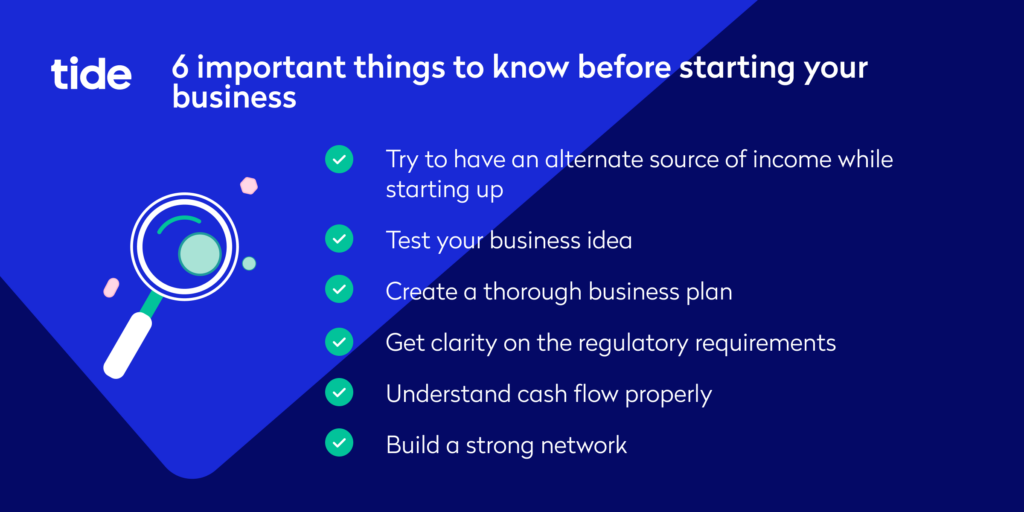
6 important things to know before starting your business

Entrepreneurship in India has been on a steady rise and the number of new businesses being set up in the country is growing. More than 167,000 companies were set up in FY22, the highest in 3 years, as per a report by the Ministry of Corporate Affairs (MCA).
While having a great business idea is important, so is a well-thought out sustenance plan. Consider the case of small businesses in India. From ideation, to execution to sustenance, a lot goes into making a business successful. An entrepreneur needs to plan everything – be it finance, hiring, legal, marketing and advertising and with great attention to detail.
Starting your own venture is an adventurous job. You learn more by dealing with situations than by formal training. Your learning curve depends upon the experiences that you go through and of others around you. Here are a few tips to keep in mind before starting your small business journey:
Table of contents
- Try to have an alternate source of income while starting up
- Test your business idea
- Create a thorough business plan
- Get clarity on the regulatory requirements
- Understand cash flow properly
- Build a network

1.Try to have an alternate source of income while starting up
No matter how great your idea looks on paper, there is always an element of risk. According to the Ministry of Micro, Small and Medium Enterprises, nearly 6,000 businesses shut down during FY 2022.
You can consider starting and running your small business alongside your current job (provided it has been cleared by your company’s HR department, and it does not fall under moonlighting*). Take advantage of India’s booming gig-economy and line up some projects as a freelancer so that you have cashflow and flexibility during trying times. You can also explore saving schemes and alternative investments that can benefit you in the long and short term. This way you can have a dependable source of income while trying out your business idea in the market.
Having a job, alongside running a business, might be time consuming and physically and mentally tiring. However, you won’t have to worry about financial security, paying your bills or your savings getting drained which would create a safety net for you.
| 💡Pro Tip: Don’t ignore emergency expenses like medical emergencies/ home repairs/ unexpected travel, or any other family emergency when factoring in your lifestyle expenses. Remember, your business will not support your lifestyle expenses right from day one, so make sure you have enough corpus to sustain. |
2.Test your business idea
Your business idea should serve three purposes – solve a problem, fill a gap in the market and provide long-term value to customers. You can conduct a SWOT (Strengths, Weaknesses, Opportunities and Threats) analysis to examine if your business idea is practical and manageable.
You can evaluate your business idea on the basis of the following parameters:
- Strengths – The USP of your business such as a better product, price, after-sale service, technology etc.
- Weaknesses – Things that your business might lack as compared to the competition such as – product quality, staff, Intellectual Property, supply chain, etc.
- Opportunities – These could include the problem that you can solve for the customers, you being a niche player in the market, etc
- Threats – Your business can face a variety of challenges such as established and emerging players, changing market dynamics, regulations, your business idea becoming outdated, etc.
| 💡Pro Tip: The SWOT analysis is a good way to understand, in a realistic way, whether your idea will work or not. It can help you turn your weaknesses into strengths and opportunities. |
3.Create a thorough business plan
A business plan is a strategy that highlights a company’s goals and outlines the road map to achieve its objectives.
You can create a business plan to:
- Keep track of the goals – long and short term
- Attract investments
- Align the various functions of the business – products/services development, marketing and advertising strategy, hiring, and financial planning
Your business plan should include the following sections:
- Executive Summary: Overview of your business and what you plan to achieve
- Management Structure: Your details and that of your team
- Business Operations: Information about the business location and premises, production and IT systems
- Products and Services: Details of your products/services including pricing, etc.
- Market Analysis: Information about the target market, consumer expectations, competition landscape and the strengths and weaknesses
- Marketing Strategy: Marketing and advertising plans aimed at the customers
- Financial Planning: Financial statements, balance sheets, etc
- Budget: Information about the costs related to hiring, development, manufacturing, marketing, among other expenses
| 💡Pro Tip: You should include both short- and long-term objectives so that potential stakeholders feel confident about your business. |
4.Get clarity on the regulatory requirements
It is important for you to be aware of the Indian laws, rules and regulations related to starting and running a business. You should be familiar with the dos and don’ts of critical business processes like agreement, business contracts, safeguarding intellectual property.
Here are some important regulatory aspects that you should be up to date with:
- Company name, structure and agreements
- Business licence applicable to your industry of choice
- Taxation and accounting
- Debt and insolvency
- Employee expenses and benefits.
- Employment regulations
- Imports and exports
- Copyright patents and trademarks
- Data protection
- Waste and environmental impact
| 💡Pro Tip: For more information about setting up a business in India, you can visit the Startup India website. |
5.Understand cash flow properly
Cash Flow can be simply defined as the flow of money in and going out of a business. It is not the same as a company’s profit or sales. If your business has a positive cash flow, it means that there is more money coming into it than flowing out. A negative cash flow means more money is leaving the business than flowing in.
You should conduct regular cash flow analysis to correctly understand your cash position. You must also do a cash flow projection, to monitor your outgoings and keep a check on the minimum amount of money you need every month to ensure your business is sustainable. Try to avoid late payments to ensure a positive cash flow. You can use accounting and bookkeeping software to manage your payments.
Here are some benefits of a robust cash flow:
- Helps take care of short-term debt
- It is useful for expanding the business
- You can access finance as and when needed
- Helps prepare for financial crunch
- Improves planning and decision making
- Makes your business more valuable
6.Build a network
As a small business owner, networking is critical for your company and for your individual growth. Building relationships takes time and a lot of effort but for a small business, it is one of the most successful ways to grow. Networking is one of the most important ways to find and keep customers.
Here are a few benefits of networking for your small business:
- Exchange of ideas, knowledge and feedback
- Opportunities for partnership for a big project
- Demo requests for products and services
- Referrals and leads from your connections
- Observe and understand best industry practices
- Identify new business trends
Wrapping Up
All small business owners know that growth opportunities can come knocking anytime. And so can the unexpected issues. Before starting a business, you should be in a position to address the problems and embrace the opportunities for stability and long term success.
Glossary
Moonlighting is the practice of taking on secondary projects and assignments while working with an organisation without the employer’s knowledge. According to livemint (a financial news daily/website), a person may work more than one job in India without breaking the law. However, a person with a similar set of jobs could give rise to concerns about a violation of confidentiality because many employers include such restrictions in their employment agreements in addition to prohibitions against holding down multiple jobs.



